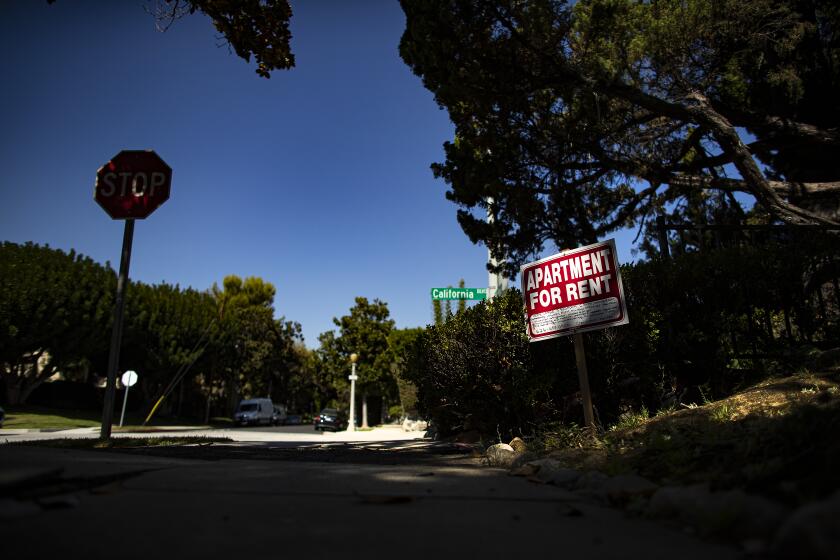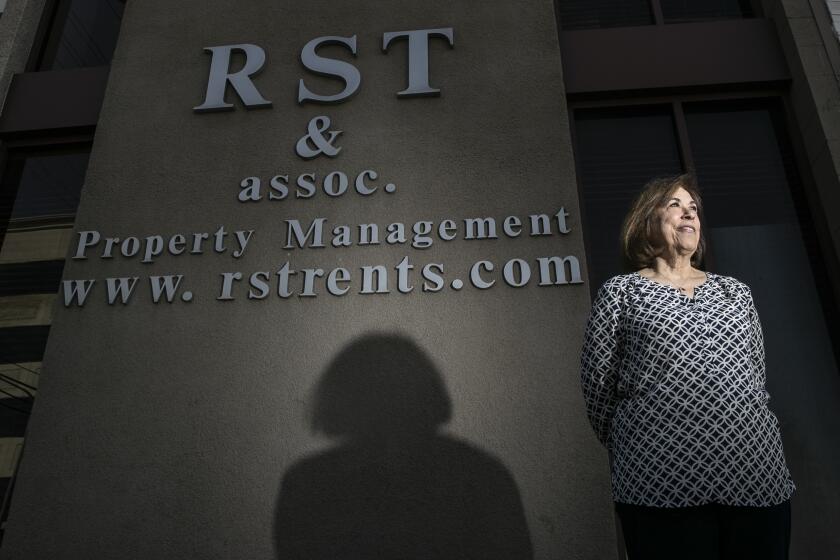Proposed L.A. law banning landlords from harassing renters clears a key hurdle

- Share via
Los Angeles could soon usher in a new law that would ban landlords from harassing renters, more than four years after such a measure was first proposed at City Hall.
The proposed ordinance, which advanced through a key committee on Wednesday, would prohibit landlords from targeting renters in a range of ways, including threatening tenants with physical harm, telling others about their immigration status, falsely telling renters they have to clear out of a unit, and failing to follow standards to protect them from dust and asbestos.
It would also ban landlords from retaliating against tenants for organizing an association or union.
Renters and their advocates have championed the proposal for years, arguing that it would give tenants a desperately needed tool to fight threats and mistreatment meant to prod them out of their homes.
“My landlord knows that the rental market is in his favor; he can behave in an egregious manner without serious repercussions,” Glassell Park renter Nancy Popp wrote to council members, urging them to pass the new law. “If he is able to force me to leave my home, there will be a line of applicants eager to pay significantly more than I can afford.”
Landlords opposing the law, in turn, argue that the new ordinance would charge excessive fines, fail to protect landlords from threatening tenants and create a bonanza for attorneys pursuing dubious claims.
Los Angeles opened applications for its rent-relief program, which aims to help tenants and landlords with debt stemming from the COVID-19 pandemic.
“It’s like open hunting season on landlords by unscrupulous lawyers,” said Daniel Yukelson, executive director of the Apartment Assn. of Greater Los Angeles.
On Wednesday, a council committee decided to move forward with the proposed ordinance, paving the way for the full council to vote it into law. Councilman Gil Cedillo said it was aimed at “the small percent of despicable, predatory, bullying landlords,” declaring that it would put those “outliers” on notice.
In an unusual move, however, Cedillo asked city lawyers to incorporate suggested amendments from both Councilwoman Nithya Raman and Councilman John Lee — some of which conflict — and come up with legal wording for final approval. Cedillo said he wanted city attorneys to determine “the best legal expression of our policy objectives.”
“We’ll get the language before we go to the City Council,” Cedillo told Raman, and if she or any other council member dislikes the resulting language, “you can then raise those objections.”
Tenant advocates said they were concerned about how city attorneys would reconcile the conflicting amendments and whether it would lead to delays in passing the law.
The proposed law would spell out more than a dozen categories of banned acts, including eliminating parking or other amenities required under a lease, refusing to accept rental payments, and improperly demanding information that violates tenants’ privacy.
Raman, in her suggested amendments, had also suggested they ban landlords from trying to “coerce” tenants to vacate with payment offers.
Lee, in turn, proposed that the city tighten the definition of harassment to specify that it “would cause a reasonable person to suffer substantial emotional distress,” in contrast to broader wording suggested by Raman.
Flouting the law could be a misdemeanor. Tenants would be able to go to court to stop landlords who violate it, seeking civil penalties of up to $10,000 per violation, plus another $5,000 each for violations affecting elderly or disabled tenants. Renters could also bring up such harassment as a defense against an eviction.
Yadira Michel and Alonso Cecenas said they would welcome the new law as they face the threat of being evicted by their landlord, who they said has left their South Los Angeles apartment without hot water, threatened to report them to immigration authorities, and summoned police to detain Cecenas on false claims of attacking him.
“My 10-year-old daughter, my 4-year-old son, they panic when someone rings the doorbell or knocks hard on the door,” Cecenas said in Spanish.
The proposed law has been more than four years in the making: Then-Councilman Jose Huizar asked the city to look into such an ordinance in 2017, citing similar protections in San Francisco, Santa Monica and West Hollywood. Tenants and their advocates have complained that landlords have pressured people to abandon their apartments as rents have soared.
Popp, who later sued her landlord, said the man had sexually harassed her, neglected to do repairs, showed up unannounced and tried to eject her from her cottage after she filed a complaint about a rat infestation. The landlord denied her allegations in a legal filing. Popp said the two eventually settled out of court.
The new law “is just the first step towards equity,” said Popp, an artist who is active with the Los Angeles Tenants Union.
Landlords, in turn, have complained that the law does not address situations in which tenants harass or threaten them. One woman who called into a March meeting said her tenant harassed her regularly, “even though I am his landlord.” Others raised concerns that vague and overly broad wording in the law could improperly penalize property owners.
The law “must include mutual protections rather than represent another example of one-sided, overreaching and excessively burdensome policies disproportionately impacting rental housing providers,” Diane Robertson, a founding member of the Coalition of Small Rental Property Owners, wrote in a letter to council members.
Yukelson, who heads the apartment association, said the proposed law states that failing to make needed repairs or not following “applicable industry standards” for minimizing exposure to dust, noise and other hazards during repairs and maintenance can be a form of harassment, but “who knows what ‘industry standards’ are?”
In addition, Yukelson argued that state law already prohibits harassment by landlords. Curtis Skinner of the Legal Aid Foundation of Los Angeles countered that those California codes can be difficult for tenants to decipher and employ.
“By defining what harassment actually is, it makes it much easier for a tenant to go into court and say, ‘You can’t fail to make repairs when you need to make repairs,’ as opposed to having a tenant try to figure out, ‘What does it mean for a landlord to violate my “quiet enjoyment” of a premises?’” said Skinner, a community economic development fellow.
“There’s no wiggle room for a landlord to say, ‘I didn’t know that was harassment,’” Skinner said.
Landlords argued that they should get a chance to fix alleged violations before a tenant goes to court.
Under a draft of the proposed law, tenants could not go to court over allegations of neglected repairs or maintenance before the landlord was informed of the problem in writing and the landlord failed to fix it within “a reasonable period of time.”
New data show how property owners in Los Angeles — especially mom-and-pop landlords — are having trouble paying mortgages and keeping up with maintenance costs as their tenants miss rent.
Raman wanted to amend the law to allow tenants to provide any form of notice, written or not. Lee, in turn, wanted to ensure written notice was still required and provide the same “right to cure” for other allegations of harassment besides those involving repairs — a key request of property owners.
Tenant advocacy groups, in turn, pressed for the city to bar landlords from increasing the rent after harassing tenants out of a unit, which they argued would eliminate the incentive to do so. Raman proposed adding such a provision.
If the law is approved by the full council, more than 850,000 units are expected to be subject to the ordinance when it goes into effect, according to city reports. The rules would cover apartments of all kinds, as well as houses and condominiums owned by corporations.
In the face of a budget crisis, the housing department pulled back on requests for more staff to help enforce the ordinance. The department also said it will not ask city attorneys to help resolve disputes, but refer them to their own eviction defense program or outside groups that aid tenants.
More to Read
Sign up for Essential California
The most important California stories and recommendations in your inbox every morning.
You may occasionally receive promotional content from the Los Angeles Times.
















